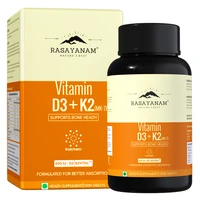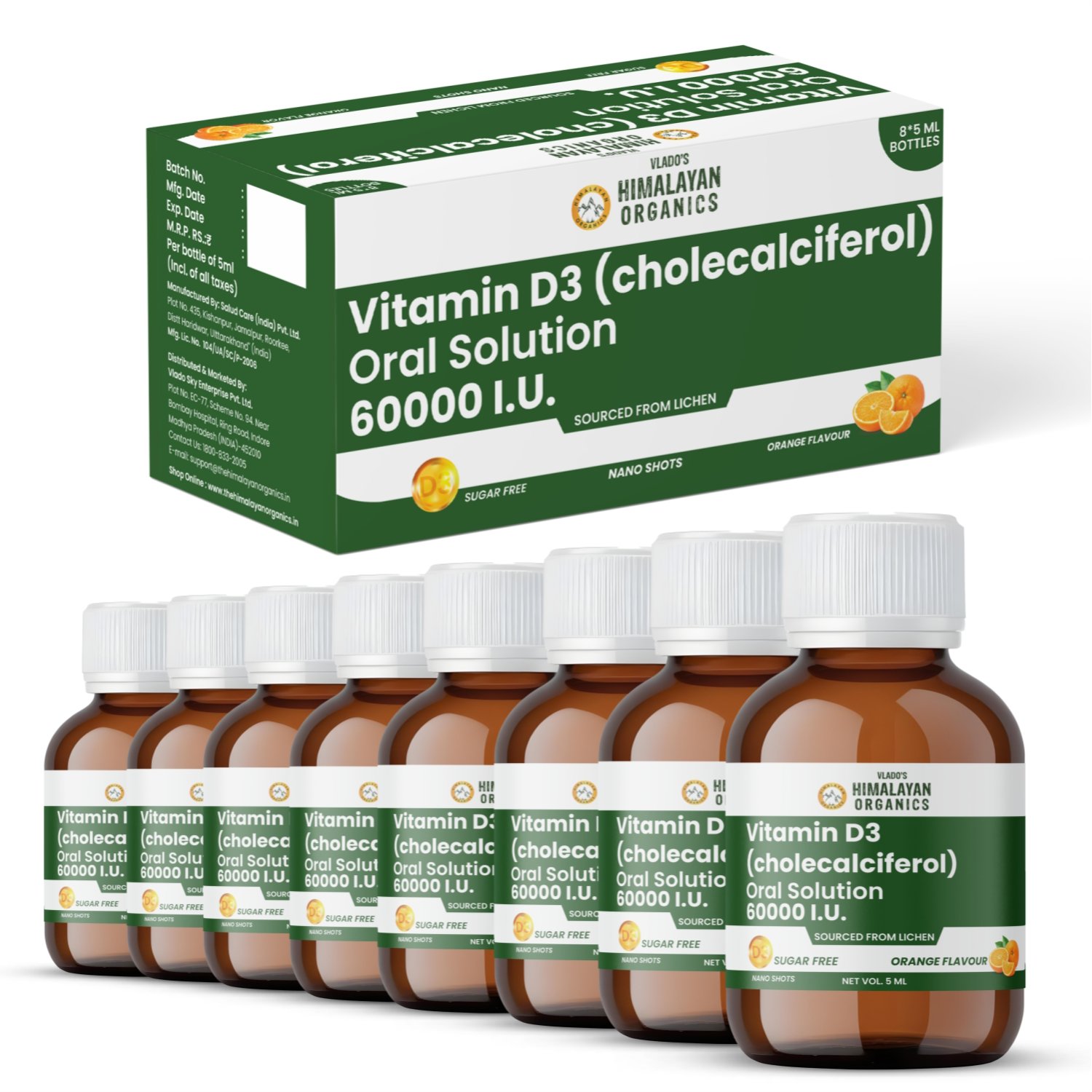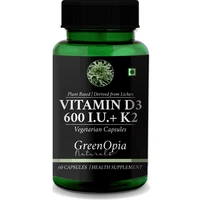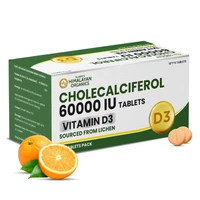Vitamin D
Essential for bone health, calcium absorption, and immunity. Deficiency is widespread, especially in low-sunlight regions.
25% OFF

Rasayanam Vitamin D3 + K2 (mk-7)
₹519
MRP: ₹699
Add29% OFF

Vlado’s Himalayan Organics Vitamin D3 With K2 As Mk7 Supplement
₹709
MRP: ₹1,008
Add52% OFF

Vlado's Himalayan Organics Vitamin D3 Oral Solution 60000 I.u.
₹499
MRP: ₹1,045
Add44% OFF

Healthyhey Nutrition Natural Vitamin K2 Mk-7 + Vitamin D3
₹999
MRP: ₹1,799
Add25% OFF

Greenopia Vitamin D3 600 Iu With K2
₹749
MRP: ₹999
Add
Vlado's Himalayan Organics Cholecalciferol 60000 Iu Vitamin D3
₹959
MRP: ₹960
Add
Vlado's Himalayan Organics Vitamin D3 10000iu Cholecalciferol
₹1,071
MRP: ₹1,072
Add
What is Vitamin D?
Vitamin D is a fat-soluble vitamin. Our skin, on exposure to sunlight, can produce this unique vitamin. Salmon, sardine, mackerel, cod liver oil, egg yolk, mushroom, and fortified foods like milk, orange juice, cereal, and yoghurt are the sources of vitamin D. Apart from vitamin D foods; one can also obtain it through supplements.
Vitamin D is vital for strong muscle, dental, and bone health, and research supports its significant role in preventing heart disease, type 2 diabetes, osteoporosis, influenza, and depression.
Vitamin D is highly crucial because it promotes strong bones by helping the body use calcium and phosphorus from the diet. Vitamin D deficiency is very prevalent among children, young and middle-aged adults. When the sunshine vitamin is deficient over time, the body is more likely to experience a state of fragility characterized by uncomplicated fractures, reduced bone density, fatigue, muscle loss, etc.
Vitamin D: Benefits & Uses
Vitamin D has numerous roles to play in our body.
- Healthy bones: If you need strong bones, ensure that your calcium and vitamin D levels are adequate. Low vitamin D levels can soften bones and increase the risk of fractures and injuries. We need Vitamin D for calcium and phosphorus absorption and to retain these nutrients in the body.
- Strong immunity: Vitamin D plays a vital role in the immune system. It exerts a powerful anti-microbial response and suppresses the production of inflammatory cytokines. Studies support that vitamin D protects against influenza and flu.
- Strengthen cognitive functioning: Vitamin D plays a key role in regulating mood. Prolonged low vitamin D levels are associated with increased depression and age-related neurological disorders like Alzheimer's disease.
- Reduced risk of metabolic disorders: Clinical data suggest that people with low vitamin D levels are more prone to metabolic conditions like obesity and type 2 diabetes. Vitamin D promotes better glucose utilization and a low body fat percentage.
Vitamin D Types
Vitamin D is of two types:
- Ergocalciferol (Vitamin D2): This comes from plant sources like mushrooms, fortified foods, and dietary supplements.
- Cholecalciferol (Vitamin D3): Mainly found in animal sources like oily fish, liver, egg yolk, and dietary supplements.
How to choose the right Vitamin D for you?
Besides dietary sources, vitamin D supplements are an effective and reliable option to maintain vitamin D levels and prevent deficiency. Vitamin D supplements are available in tablets, capsules, syrups, sprays, and chewable gummies.
Before finalizing any Vitamin D supplement, it is necessary to check the ingredient list. It should contain Vitamin D as a primary ingredient without fillers or additives. If you are a vegan or vegetarian, prefer Vitamin D2 form as it is derived from a plant-based source. Else, Vitamin D3 should be the first preference as this form is more effective than Vitamin D2.
The strength of Vitamin D tablets varies from brand to brand. Some may contain 2000 IU, 5000 IU, or 60,000 IU of Vitamin D per tablet. Due to this variation, one should carefully decide the dosage per body need.
The product must be certified, and it is advisable to buy from a trusted source like Nutrabay.
How to use Vitamin D?
One can simply swallow Vitamin D tablets or capsules with water. However, it is better to take Vitamin D supplements with calcium-rich food like milk, curd, and paneer for enhanced absorption.
Vitamin D syrups or gummies are a better option for children and older adults as they are easy to consume.
Where to buy Vitamin D?
You can visitNutrabayto avail best vitamin D tablets in India. Nutrabay provides you with the best prices and deals on all brands, making it one of the most affordable options for purchasing supplements. You can be assured of 100% genuine products and the best vitamin D capsule price with Nutrabay, as each one is sourced from the brand directly.
Is Vitamin D safe to use?
Vitamin D supplements are generally safe to consume. However, it is essential to remember that Vitamin D is a fat-soluble vitamin and can result in toxicity if consumed in excess.
Therefore, if you plan to start with Vitamin D supplements, carefully decide the dosage to avoid excess Vitamin D accumulation in the body.
In case of any doubt, confer with a doctor to understand the dosage as required.
Frequently Asked Questions (FAQs)
1.What are the side effects of taking Vitamin D supplements?
One should not exceed the recommended dosage while taking Vitamin D supplements. Overconsumption is associated with the following Vitamin D side effects:
- Nausea
- Diarrhoea
- Loss of appetite
- Headache
- Constipation
- Dry mouth
- Metallic taste
- Vomiting
- Calcification of bones
- Hardening of blood vessels, lung, heart, and kidney tissues
2.What are the symptoms of Vitamin D deficiency?
Here are some of the Vitamin D deficiency symptoms:
- Poor immune health
- Fatigue
- Bone pain
- Back and joint pain
- Impaired wound healing
- Muscle pain
- Hairfall
- Low mood
- Rickets in children (in case of prolonged deficiency)
- Osteoporosis in adults (in case of prolonged deficiency)
- Infections
- Weight gain
3.What are the causes of Vitamin D deficiency?
Here are some Vitamin D deficiency causes:
- Limited sunlight exposure.
- Excess use of sunscreen lotions.
- People with dark skin with a high melanin content reduce the skin's ability to produce vitamin D from sunlight.
- Inadequate Vitamin D-rich foods intake.
- High pollution levels.
- Breastfeeding.
- Spending more time indoors.
- Ageing.
- Reduced ability to absorb dietary fat in the body.
4.What is the normal range of Vitamin D in the blood?
Normal Vitamin D level: Between 30-50 ng/ml.
Vitamin D deficiency: Less than 20 ng/ml.
People prone to deficiency: Between 20-30 ng/ml.
Vitamin D toxicity: More than 100 ng/ml.
5.What is the best time to get Vitamin D from the sun in India?
Studies say that sunlight exposure between 11 AM and 2 PM is good for promoting vitamin D production in the skin.
6.What is the daily requirement of Vitamin D?
The daily requirement of Vitamin D for Indians as per ICMR:
Infants: 400 IU or 10 mcg/ day.
Children: 600 IU or 15 mcg/ day.
Adults: 600 IU or 15 mcg/day.
7.What is the ideal Vitamin D dosage?
The dosage of Vitamin D may vary from brand to brand. For example, one can take a Vitamin D tablet of 1000 IU per day, whereas pills with 60,000 IU of Vitamin D are recommended once weekly. Therefore, one must seek medical advice before starting any Vitamin D supplement.
- Rasayanam Vitamin D3 + K2 (MK-7)₹519
- Vlado’s Himalayan Organics Vitamin D3 with K2 as MK7 Supplement₹709
- Vlado's Himalayan Organics Vitamin D3 Oral Solution 60000 I.U.₹499
- HealthyHey Nutrition Natural Vitamin K2 MK-7 + Vitamin D3₹999
- GreenOpia Vitamin D3 600 IU with K2₹749
- Vlado's Himalayan Organics Cholecalciferol 60000 IU Vitamin D3 ₹959
- Vlado's Himalayan Organics Vitamin D3 10000IU Cholecalciferol₹1,071




